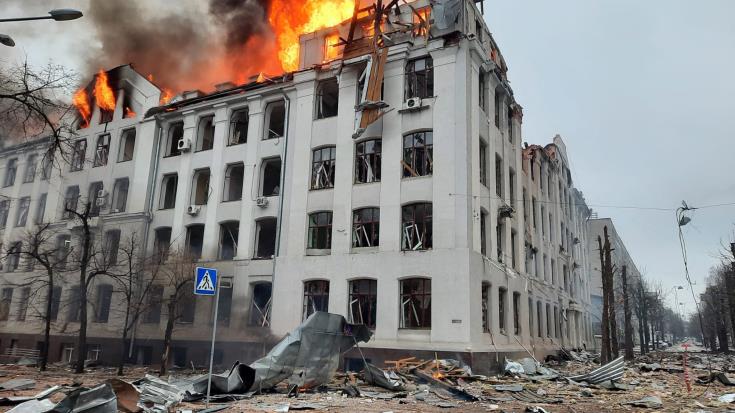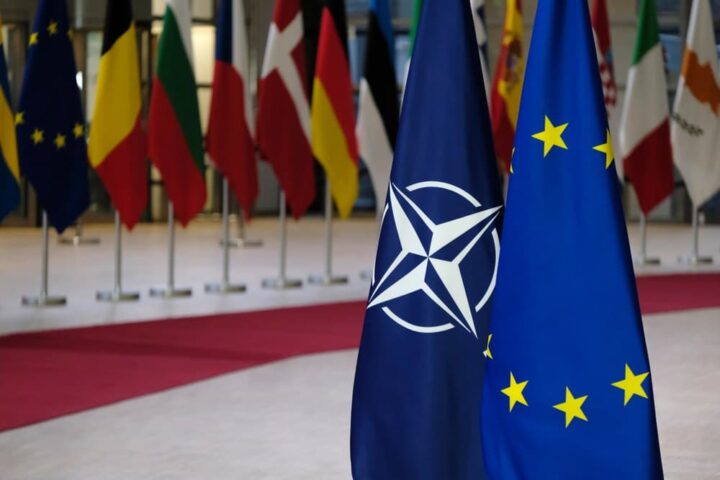In the early hours of February 24, Russia’s President Vladimir Putin announced his long anticipated war in Ukraine.
In his address to the Russian people he said, “I am referring to what causes us particular concern and anxiety – those fundamental threats against our country that year after year, step by step, are offensively and unceremoniously created by irresponsible politicians in the West.
“I am referring to the expansion of NATO to the east, moving its military infrastructure closer to Russian borders.”
More than 190,000 Russian troops poured into Ukraine from the Donetsk and Lugansk regions in the east, from Belarus to the north and from Crimea to the south. Russian forces made little advances to this day amid fierce resistance from the Ukrainian army, local and international volunteers.
The West is supplying arms to the Ukrainians to repel Putin’s forces which are facing serious logistical and organisational problems. Despite overwhelming air power, the Russian air force has yet to achieve air dominance after three weeks of fighting, while Ukrainian drones and anti-tank weapons supplied by US, Britain, the Baltic states and Poland, have helped inflict devastating losses.
Casualty estimates vary considerably, and we have been unable to pick a number with respect to losses suffered by each side. Western analysts estimate that Russians lost somewhere between 20-40% of their original force designated for this war.
Kyiv, the political target, capital and biggest city of Ukraine has yet to be surrounded by Russian forces despite repeated attempts and considerable losses. President Volodymyr Zelensky has been a source of inspiration for his people and the West.
Germany broke its decades-long policy and sent arms to Ukraine. In addition, it announced a massive rearmaments programme of 100 bln euros.
Demoralising losses
Maj Gen Oleg Mityaev is the fourth general reportedly killed by the Azov regiment near Mariupol, Ukrainian media said. Ukrainian forces appear to kill a Russian general every six days, a killing rate that is demoralising the Russian high command, while boosting morale for Ukrainian ground troops.
According to a Ukrainian government official, “intelligence is looking for high profile generals, pilots, artillery commanders.”
Earlier this week, a theatre in the besieged city of Mariupol was targeted by Russian forces and suffered extensive damage. According to news reports, the theatre was sheltering 1,300 people, but so far only 130 came out alive. The city is under constant bombardment and indiscriminate shelling from Russian forces which forbid citizens from leaving or food and water supplies to go in.
Ukrainian forces are fighting hard and repelling Russian attacks with great skill. From 4 a.m. on February 24, when the Russian offensive began, to midnight on March 14, the Office of the UN High Commissioner for Human Rights (OHCHR) recorded 1,834 civilian casualties in the country: 691 killed and 1,143 injured.
In Donetsk and Luhansk regions: 751 casualties (173 killed and 578 injured)
At the UN, 141 countries condemned Putin’s invasion and only four dictatorships (Syria, N. Korea, Eritrea and Belarus) and Russia voted against the motion. China, India and 33 more abstained.
Belarus and its dictator held a phoney referendum on letting Russia station nuclear weapons on its soil. So much about the nuclear threat. Meanwhile, the EU, Britain and America fired new sanctions against the puppet state.
The Eurozone’s inflation hit 5.8% in February, while energy prices jumped by 31.7%. Many economists fear that more increases are to be expected across the board as higher production and transportation costs will ultimately translate into higher consumer prices.
The Russian Central Bank suspended trading at the Moscow Stock Exchange following the invasion. Sberbank, Russia’s biggest commercial bank ceased operations in Europe indefinitely.
Russia’s Central Bank chief resigned on Friday. Elvira Nabiullina, 58, reportedly handed in her resignation after arguing with Putin over the devastation caused by western sanctions on the Russian people. The central bank has been deprived access to much of its foreign exchange reserves and was forced to raise the interest rate to 20% in order to defend the rouble that has lost its “o” after shedding nearly 50% of its value.
Reuters reported on Friday that Russians have more than $213 bln stashed offshore in Swiss banks.
As economic and political conditions in Russia rapidly deteriorate, a massive exodus of the rich and the well to do is expected to pick pace. Dubai, Switzerland, Cyprus, Latin America and Finland are some of the preferred destinations.
Cyprus is already a preferred destination of many Russians for more than a decade.
Michael S. Olympios is an economist, business advisor, Editorial Consultant to the Financial Mirror










